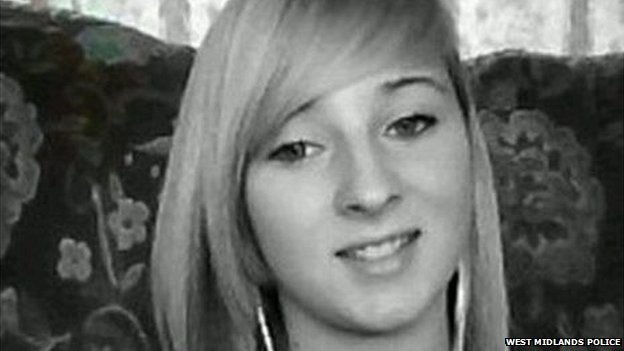Christina Edkins killing was 'preventable', report says
- Published

The death of a teenager stabbed on her way to school could have been prevented if her killer had been given mental health treatment, a report has found.
Christina Edkins, 16, was killed by Phillip Simelane, 23, on a rush-hour bus in Birmingham in March 2013.
An inquiry found that medical staff, police and the prison service missed chances to get him treatment he needed.
It said his mother's repeated requests to GPs and social workers to get him treatment were ignored.
The family of Simelane said in a statement: "The mother's cry was not heard or taken into consideration until innocent lives were impacted upon.
'Random and unprovoked'
"Having read the heart-touching report, we wonder if it will change anything in the future or is it just a paper exercise meant to put our hearts at peace for little while?"
Simelane, from Walsall, had been diagnosed with paranoid schizophrenia. He admitted manslaughter last October.
He was detained indefinitely under the Mental Health Act by a judge at Birmingham Crown Court.
The inquiry found that Simelane's mental health problems were first identified 11 years ago, when he was at school.
He was involved in several violent incidents including assaulting a police officer and threatening his mother with a knife, for which he was sent to prison in July 2012.
The review into Christina's death was commissioned by Birmingham Cross City Clinical Commissioning Group (CCG), on behalf of all agencies that had dealt with him.
Dr Alison Reed, chair of the review panel, said: "The attack on Christina was random and unprovoked and therefore it could not have been predicted.
'All so predictable'
"However, it is the conclusion of the panel that as Christina's death was directly related to [Simelane's] mental illness, it could have been prevented if his mental health needs had been identified and met."
The report made 51 recommendations calling for the improved sharing of mental health information between agencies including the NHS, the police and the prison service.
Phillip Simelane timeline
April 2007: Reprimanded by police at the age of 16 after being found in possession of a lock knife.
March 2009: Given a police caution after pushing his younger brother into a wall.
May 2012: Arrested for criminal damage after breaking into his mother's house and throwing an electric fire at her.
May 2012: Holds a knife to his mother's stomach after accusing her of trying to kill him.
July 2012: Jailed for 101 days after being convicted of assault and battery in the attack against his mother.
October 2012: Seven days after being released from prison, he is convicted of trying to steal a car and possession of cocaine and breach of licence. Spends 59 days inside HMP Birmingham.
December 2012: Released from Birmingham Prison and lives rough on the city's streets.
March 2013: He fatally stabs Christina Edkins on the bus in Hagley Road.
Source: Birmingham CrossCity CCG report
Christina had been travelling to Leasowes High School in Halesowen on the number nine bus, two weeks after her 16th birthday, when she was attacked.
In a statement, Christina's family said they hoped many recommendations in Dr Reed's report would be implemented so that "no other family has to experience the heartache of such a meaningless and avoidable death of a loved one".
Her great uncle, Chris Melia, said he felt the report was "open and thorough" overall, but it showed a number of people "were just not doing their jobs".
"The one thing I would say we have a big problem with is that we think it was all so predictable," he said.
"There are many instances of people seeing the situation clearly but choosing to do nothing about taking preventative action or action to even help this guy."
He said Christina's family had requested an update in 12 months' time to inform them which of the report's recommendations had been acted on.
Some of the report recommendations:
- Children and adult social services should review whether they properly addressed issues surrounding Simelane.
- The Ministry of Justice and the Department of Health should consider developing a system to ensure prisoner health records are routinely provided to GPs after their release.
- Assessments undertaken in police cells by forensic physicians should be routinely considered for sharing with the offender's GP.
- Clearer communications should be established between local NHS services and other services (private, charity or voluntary) when a patient is receiving counselling or any other form of mental health support.
Birmingham CrossCity CCG said it had already implemented a number of recommendations, including improved access to mental health patients' records and better use of assessments completed in prison.
John Short, chief executive of Birmingham and Solihull Mental Health Trust, said Simelane had "slipped through the net" and was not assessed "at the level of risk he went on to pose".
Mr Short said Simelane was seen by "16 or 17 medical practitioners over a four-year period" and none of them felt he required hospital detention.
"It's only now with hindsight and putting together all the information we know on him that we're able to piece together a very complex mental health problem," he said.
- Published15 September 2014
- Published2 October 2013
- Published2 October 2013
- Published2 October 2013
- Published2 October 2013
- Published17 September 2013
- Published22 July 2013
- Published10 March 2013
- Published7 March 2013
- Published2 October 2013